Empowering students with language-based learning differences
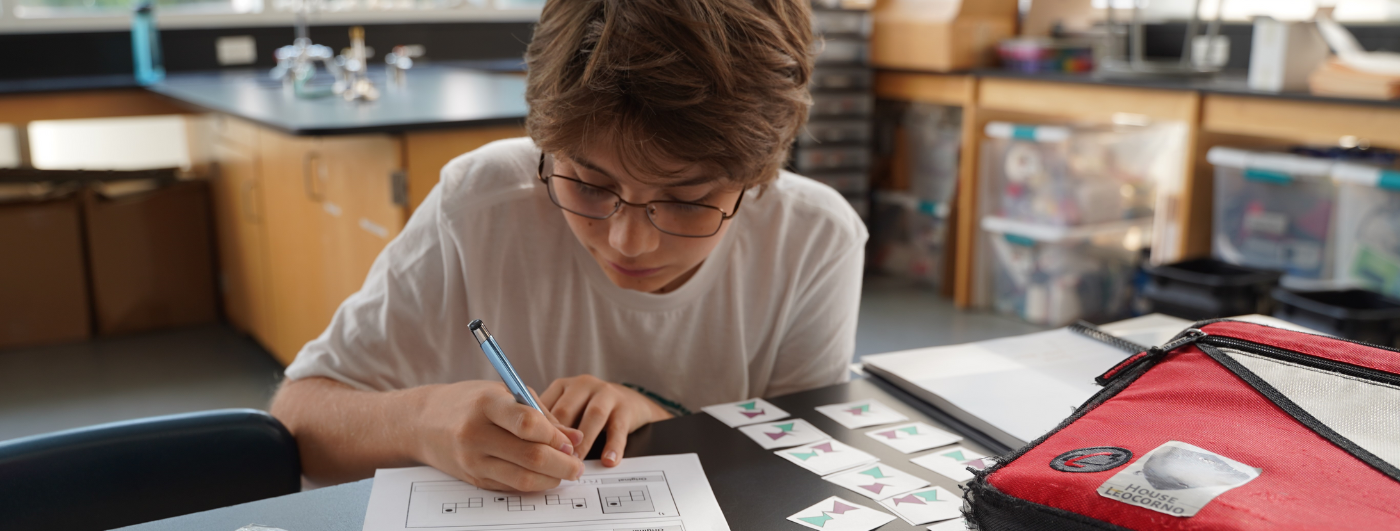
Siena Blog



The Siena School Blog
Discover, Learn, Celebrate, and Empower
Welcome to Siena's blog, your source for helpful, cutting-edge resources tailored to teachers, parents, and other advocates in the learning differences community. We are dedicated to providing a wealth of curated knowledge spanning various topics, ranging from dyslexia advocacy and awareness to classroom teaching strategies, heritage month profiles, and social and emotional health.
Discover innovative classroom strategies that inspire creativity and foster a love of learning.
Our commitment to social-emotional wellness ensures that we provide valuable insights into healthy student development and self-advocacy.
Discover resources, reading and podcast recommendations, volunteering opportunities, and more for parents in the LD community.
Our important heritage month posts highlight key people, offer reading and podcast recommendations, and more.
College Prep Begins in High School
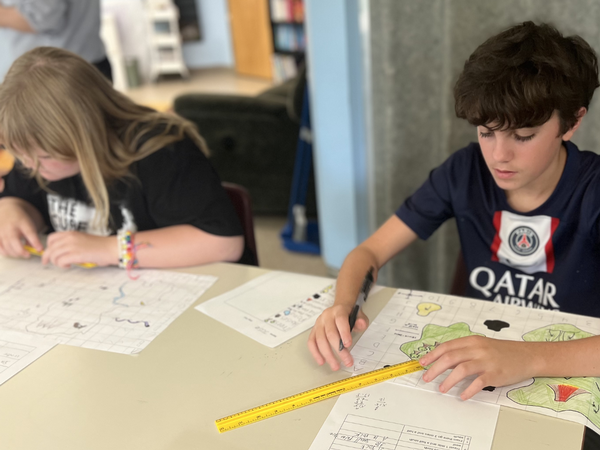
Avg. read time: 3 min.
Without the guidance of teachers and the Siena community, I wouldn’t have developed the skills and tools necessary for success. - Ozzie, Siena Class of ‘24
A high school curriculum tailored to LD students’ needs is especially important in offering an academically rigorous, supportive learning environment.
We’re taking this opportunity to highlight what Siena offers as part of our regular high school curriculum—such as counseling, test preparation, and overall college readiness—to best prepare our students for their next academic step.
Siena’s high school program at our campuses in Silver Spring, MD, and Oakton, VA, focuses on our mission and supports our high school students and families in various ways.
Preparing High School Students for College and Future Careers
A cornerstone of Siena’s high school curriculum is the multi-year college counseling program and dedicated college counselor and internship coordinator. These deliberate curricular choices guide students through all four years of high school to break down the process of applying to and then attending college.
Highlights of our scaffolded program include:
- Specializing in sciences, arts, or other areas of strength to pursue a particular field of interest in a deep, thoughtful, and rigorous manner
- Exploring potential colleges and majors and making the most of visits from college reps
- Participating in a robust internships program that allows students to follow a field or job opportunity of interest for each year of high school
- Following a structured application timeline with individualized support at each step
- Preparing for standardized tests and guidance on how to help students stand out in their applications
- Writing and revising college application essays as part of class
- Receiving merit scholarship offers (For example, Siena's Class of 2024 was offered $6,704,800 over 4 years in merit scholarships by the various colleges they applied to.)
- Guidance on selecting a supportive learning center at the college level
Such intentional design embeds opportunities for students to explore the interests they are most passionate about in high school. In addition, this develops their overall college preparedness, ranging from how to approach a writing assignment to requesting accommodations and using faculty office hours.
By the end of 10th grade, I [...] had developed strong relationships with both my teachers and peers. This made it easier for me to manage my workload with all the support around me and it made me stretch myself into other opportunities offered by Siena. - Jude, Siena Class of ‘24
College Prep and Admissions Resources
Families wanting to ensure college preparedness can review some recent articles on current college admissions trends, such as:
- Campus to Career Crossroads (2024)
- College Data (2024)
- College Matchpoint 2024
- College Matchpoint 2025
- Passion Prep (2024)
- Top Tier Admissions (2024)
These and other resources typically outline some key skills colleges look for in their applicants, such as collaboration, social awareness, and leadership.
Dyslexia Resources for Families
Families in the LD community can read some recent blog posts about dyslexia, including Dyslexia Reading and Podcast Recommendations and Building Confidence in LD Students.
The Siena School, a national leader in dyslexia education, serves bright, college-bound students with language-based learning differences on DC Metro area campuses in Silver Spring, MD (grades 3-4 and 5-12) and Oakton, VA (grades 3-12).
No Cap: Tech Detox Works
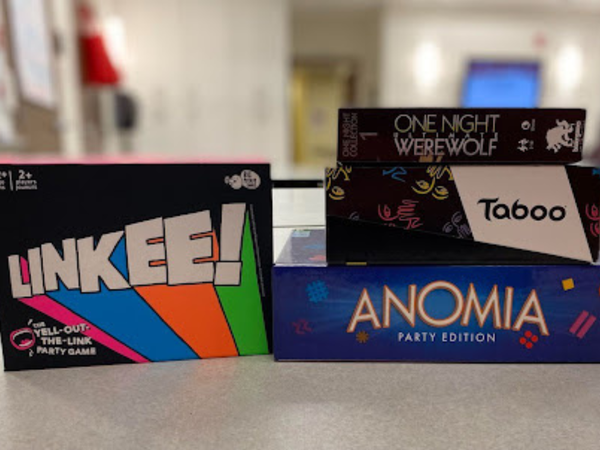
Avg. read time: 4 min.
It's lunch time. All around the school, groups of high schoolers sit, lunch bags scattered about, chatting and making jokes. A gaggle of seniors sit at a picnic table by the carpool line, half on the benches, half on the table itself, their raucous laughter loud enough to hear inside. A group of juniors sit on the steps outside the building, food laid out and music playing from a laptop. In the gym, students from all grades shout and shoot baskets, sneaking sips of water and bites of lunches in between plays.
.jpg)
Meanwhile, in the school’s common area, a hodgepodge collection of high schoolers from various grades crowd around a table with a couple of teachers, a hilariously intense game of Taboo under way.
"Potato!" a high schooler shouts.
Ordinarily, this might seem a bit unusual, but this school year is different.
What brought about this wholesome series of images? Yondrs.
New High School Cell Phone Policy
This year, The Siena School launched a new cell phone usage policy that extended our existing policy for middle school up to the high school.
Students in grades 9 through 11 are now required to Yondr their cell phones and other smart devices (Apple Watch, Google Pixel Watch, etc.) from 8:30am to 3:10pm. Seniors are exempt from this policy as they work to self-monitor their tech usage in preparation for college and beyond.
As Head of School Katie Douglas shared in a communication to families at the start of the school year, "As there is not yet enough research to inform the impact of cell phone and social media access for young people at a crucial stage in their development, we are going to take a more proactive approach in our school policy."
The new cell phone policy has already made a noticeable difference this year.
Students and the New Cell Phone Policy

Unsurprisingly, this change was initially met with many complaints. Students objected to this separation from media they were accustomed to consuming during breaks. They insisted that leaving the phone in their pocket was sufficient. On the more serious side, they worried over their ability to contact family and friends in the event of an emergency.
Advisors, faculty, staff, and administrators provided reassurance and alternatives. Students can socialize face-to-face during breaks. They can still participate in TikTok dances; they simply can't record or scroll through TikTok itself during the school day. Regular daily contact with family can be handled through the Front Office, so students can reach their families when needed.
We're about a month into the school year now, and the vast majority of concerns have subsided. That said, not everyone is convinced.
"There are some days where I really need my phone during 8th period," one student shares. "I pick up my siblings and I have to coordinate times."
Another student nods: "I've always used my phone for reminders," he says. "Setting reminders on my computer is not the same."
Some students are noticing the culture shift, though, especially during study halls and lunch. Several students have gone outside to the playground during lunch for some fresh air and activity.
"Before, I would be on social media [during study hall]," “Not having my phone [...] has allowed me to finish my homework before I go home.”
And, for this 11th grader, waiting in the hallway for class to start: "I don't even bring my phone to school. It feels better."
Moreover, several Siena teachers and staff members have noticed students being more present when interacting. “They’re actually talking to each other and engaging in conversations,” said a high school teacher. “It’s refreshing to see.”
Research on Cell Phone and Social Media Use in Teens
Although the lasting effects of social media and frequent cell phone use on teens is ongoing, some recent research suggests benefits of such limits, for example:
- U.S. Department of Health and Human Services (May 2023), Surgeon General Issues New Advisory About Effects Social Media Use Has on Youth Mental Health
- Washington Post (August 2024), Cellphone Bans Spread in Schools Amid Growing Mental Health Worries
- New York Times (August 2024), Why Schools Are Racing to Ban Student Phones
- MoCo 360 (August 2024), Cell-Phone Restriction Pilot Program, Mandatory IDs Among New MCPS Safety Measures
Siena Blog and Resources
Want to know more about lunch games? Here's a list of the ones offered during High School lunch:
For additional relevant information from The Siena School blog, see our Parents and Community category, as well as previous posts about Mental Health Awareness for teens and the benefits of early intervention for LD students.
The Siena School, a national leader in dyslexia education, serves bright, college-bound students with language-based learning differences on DC Metro area campuses in Silver Spring, MD (grades 3-4 and 5-12) and Oakton, VA (grades 3-12).
Winter Break Podcast Recommendations

Avg. read time: 2 min.
Keep your high school and middle school students excited about learning and knowledge over winter break with these podcast recommendations from Siena students and faculty.
Podcast Recommendations for Teens
Check out these history, culture, and society podcasts for your teen:
- The Daily Show with Trevor Noah
- Footnoting History
- Forever Ago
- Let's Be Real with Sammy Jaye
- Outside Magazine Podcast
- Pop Culture Happy Hour
- Spilled Milk Podcast
- Stuff You Should Know
- Uncivil
Is your teen interested in science and related topics? Give these podcasts a listen:
- 60-Second Science
- Are We There Yet?
- Brains On!
- Hidden Brain
- How I Built This
- Invisibilia
- Radiolab
- Science Friday
- Science Rules!
- Wow in the World
Teens interested in books, music, and storytelling can try out these podcasts:
Give these family-friendly podcasts a listen:
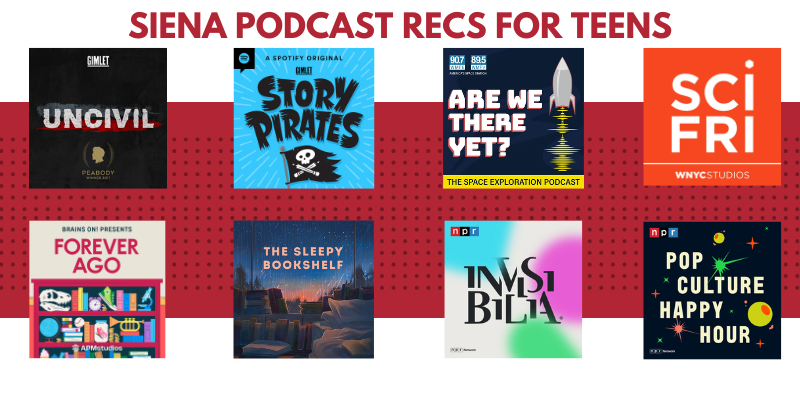
More Podcast Resources
Common Sense Media lists these Great Podcasts for Tweens and Teens, and Parents magazine recommends 9 Great Podcasts for Teens. See Siena’s blog for winter break book recommendations and summer break book recommendations. See also this earlier blog post about podcasts from Siena Reading Teacher Leslie Holst.
Siena’s mission-focused innovative dyslexia education is designed for students in grades 3-12 with language-based learning differences on campuses in Silver Spring, Maryland, and Oakton, Virginia.
Summer Reading at Siena
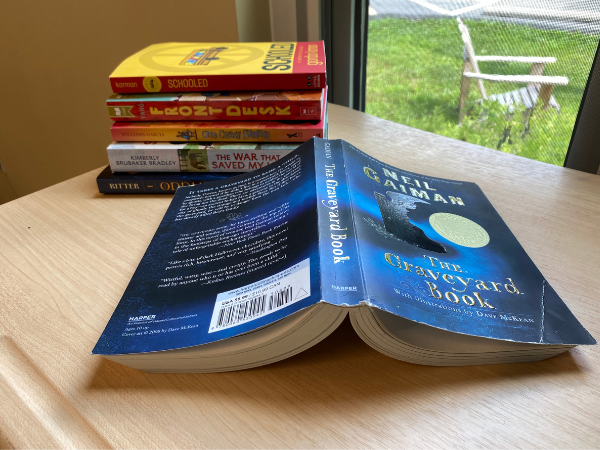
Benefits of Summer Reading
Summer reading is important for students’ academic and social-emotional development, but how can they find age-appropriate books that are also interesting and relatable to their experiences?
As this 2021 post from Scholastic points out, “Summer reading is critical, not only for helping kids maintain learning while school is out, but also for fostering social–emotional development, discovering the joy of stories, and elevating the importance of lifelong learning.”
Summer reading—even 15-20 minutes a day—helps students with dyslexia and other language-based learning differences: it will keep their reading, retention, and decoding skills sharp in preparation for the coming school year. Regular reading also helps students’ social–emotional skills by sharpening their awareness of the world, as well as increasing their empathy and ability to understand various points of view.
Getting students to read over the summer can be a challenge. But knowing what their peers have read and enjoyed can help, especially when students have diverse stories, characters, identities, and genres to choose from.
Summer Reading Recommendations for Teens and Tweens
At the end of the school year, Siena teachers shared summer reading packets, which included recommendations and class readings for students across all grade levels. Teachers typically assemble their own reading lists to share with students, and they always choose a variety of books that reflect Siena’s diverse community and curriculum. Here are some of the books Siena’s students have been reading this summer:

To further help students and parents, Siena Humanities chair and middle school English teacher Beth Fabijanic shared that the Young Adult Library Services Association (a division of ALA) offers ample recommendations for teen/tween readers, including:
- Quick Picks for Reluctant Young Adult Readers
- Best Fiction for Young Adults
- Great Graphic Novels for Teens
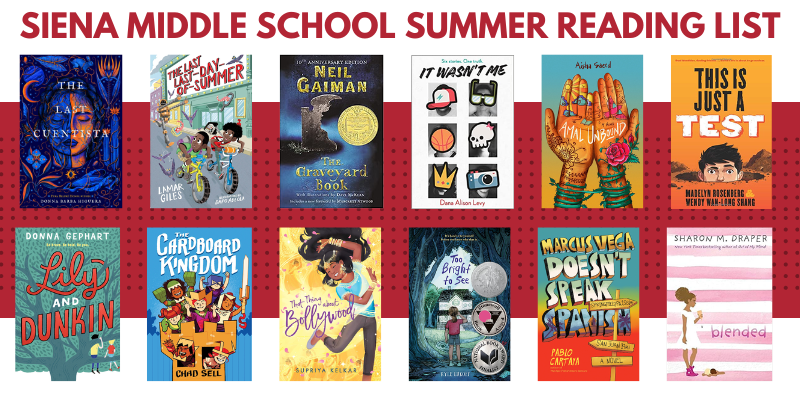
Students who prefer to listen to books—or who perhaps want to read along while listening—should also explore the audiobook selections on Amazing Audiobooks for Young Adults, Learning Ally, Audible, and Audiobook Sync (which updates free audiobooks for teens every week).
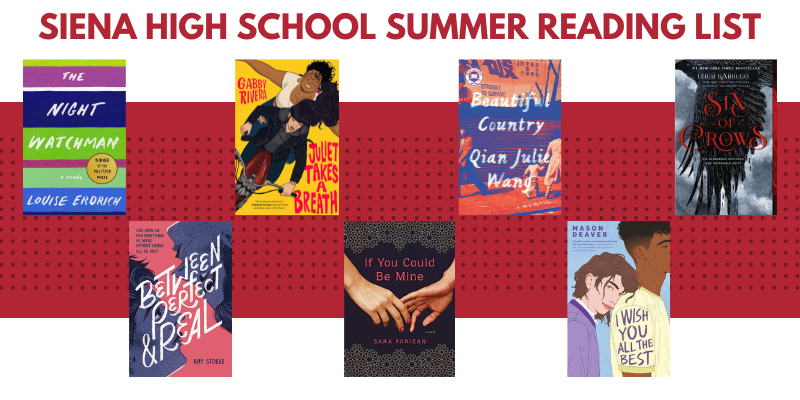
Resources for Summer Reading
“Children often react very differently when a parent or teacher tells them to do something compared to when they make a decision on their own,” this Dyslexia Resource post from 2020 observes. “When age-appropriate, encourage growing readers to develop their independence by allowing them to create their own summer reading schedule. While beginner readers should read around 20 minutes each day, leave the rest up to your student.”
Choosing their own daily reading time can give students a sense of control over the process, while the routine of summer reading can prepare them for the more structured days of the school year.
Here are some additional resources to help students with summer reading:
- Education consultant Ann Dolin recently wrote about engaging reluctant readers over the summer, including a handful of recommendations for different ages and suggestions for reading as a family.
- Fairfax County Public Library Teen Events and Resources and Montgomery County Public Library For Teens offer recommendations, events, programs, and more. Check public libraries in your area for similar summer reading services for young people.
- The National Education Association offers ample resources, activity ideas, and links for students to Get Serious About Summer Reading.
- The New York Public Library’s Staff Picks for Teen Readers goes back to Spring 2019 and lists English- and Spanish-language books.
Siena’s blog has more helpful resources for summer, including how students can improve their technology skills over the summer and how summer academics and camps can be beneficial.
